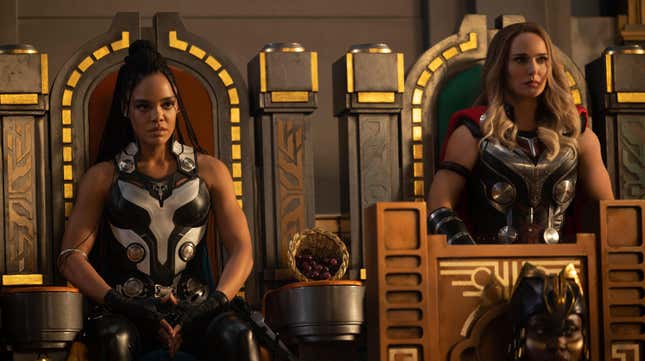‘Thor: Love and Thunder’ Could Have Been Gayer, Honestly
Director Taika Waititi and cast member Natalie Portman promised us a very gay film. Sadly, it under delivered.
EntertainmentMovies

What is it with straight people and writing checks they can’t cash? The cast of Thor: Love and Thunder promised us the movie would be, as director Taika Waititi’s put it, “super gay.” Star Natalie Portman said it was “so gay.” But I’m here to report back that it was only a little bit gay.
In one of Marvel’s gazillion offerings this year, Thor, the god of thunder, is (literally) getting back in shape following the events of Avengers: Endgame, and traversing the universe with the Guardians of the Galaxy. That is, until Christian Bale’s Gorr the God Butcher kidnaps a bunch of children and threatens to kill all gods in one fell swoop. To stop this, Thor and co. swing into action.
Much of the movie is super colorful and very upbeat—which I loved—so maybe that’s what Waititi and Portman were referring to? But beyond that, it definitely could have been a lot gayer.
The much-exaggerated gayness in question is primarily backstory, or hinges on Tessa Thompson’s unflinching sexual charisma as King Valkyrie, the new leader of the Asgardian people (after Thor handed her the reins at the end of Endgame). In a fleeting moment in Love and Thunder, Valkyrie sensually kisses the hand of a woman, before flying away—but that’s it.
-

-

-

-

-

-

-

-

-

-

-

-

-

-

-

-

-

-

-

-

-

-

-

-

-

-

-

-

-

-

-

-

-

-

-

-

-

-

-

-








































